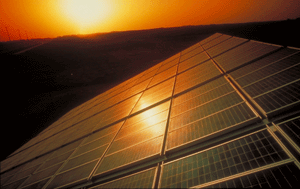Energy Economies

The August '05 issue of National Geographic has a wonderful article on the future of energy generation. Fossil fuels are still (relatively) plentiful and (relatively) cheap, but frankly they don't have much life left in them. Whether oil becomes too scarce to be the viable base of our economy in five years or fifty, it's inevitably going to happen, and it'll probably happen during our lifetimes. That's not the end of the show, though it will mean a lot of changes in the way we get power and the way our economy works.
This article provides a great rundown on the various technologies currently in the works to step in as a replacement for cheap oil. As the author says, this is more likely to be a congress than a president: there is no one technology or energy source that will fill oil's shoes. Oil is like heroin--the concentrated energy of billions of years of sunshine. Nothing we can do can top that. But many technologies--solar, wind, biofuels, even nuclear--working together can still probably provide all our foreseeable energy needs.
For what it's worth, my money is on solar. Sure, it works better in sunny climes than others, but what I like about it is how modular it is. Solar panels can be popped onto buildings, homes, even cars and backpacks. Solar creates a distributed network of power generation that can be increased gradually and locally depending on need and conditions. It could also create a national or global marketplace where people with extra power can sell their surplus to those in need. (A sunny day in Chicago can cancel out a rainy day in Albany.) And with improvements in battery technology, days or even weeks of power could be stored against a rainy day. Of course, any renewable system, even with battery backups and a power marketplace, is not foolproof, and some combination of solar, wind, hydro, tidal, and maybe even a few relic coal or nuclear plants, just in case, will be necessary. But solar has the potential to be the real democratic future power technology, and I think people will respond to that.
But ultimately, what will be truly interesting is to see what shape the stormclouds take when they arrive, and how easily and peacefully we weather the transition from an oil-and-gas economy to the renewable, self-sustaining energy future.
